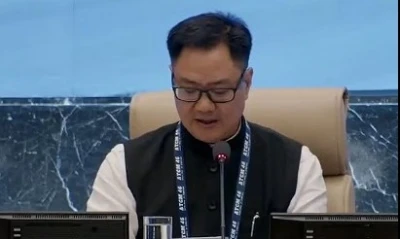Bharat advocated strongly for regulated tourism in Antarctica, asserting upon the urgent need for heightened protection and scientific study in the icy continent, as the number of visitors has surged in recent years.
“This icy expanse is not just a frozen desert; it is a dynamic, living laboratory that demands our highest commitment to protection and study,” Earth Sciences Minister Kiren Rijiju said at the inauguration of the 46th Antarctica Treaty Consultative Meeting or ATCM, echoing the sentiment of preserving Antarctica’s delicate ecosystem.
Considered the Parliament for Antarctica, the ATCM convened representatives from 56 nations, including 29 with decision-making powers, to govern the continent.
“A separate working group on developing a framework for regulating tourism in Antarctica has been set up at the ATCM that got underway here,” noted Rijiju, highlighting the proactive approach to address the challenges posed by increasing tourism.
Former deputy national security adviser Pankaj Saran was elected chairman for the 10-day deliberations, which also include the 26th meeting of the Committee for Environment Protection.
Rijiju further announced Bharat’s plans to construct a new research station, Maitri-II, to strengthen research capabilities, particularly regarding the stability of the East Antarctic ice sheet.
Expressing concern over the rise in tourist numbers, Earth Sciences Ministry Secretary M Ravichandran stressed the imperative of conducting all activities, including tourism and research, in a manner that preserves Antarctica’s ecological integrity for future generations.
“Bharat is honoured to lead this crucial initiative at the 46th ATCM that is expected to bring a series of actionable recommendations to be incorporated into the broader framework of the Antarctic Treaty System,” said Ravichandran, asserting Bharat’s commitment to driving positive change in Antarctica.
Regulating tourism in Antarctica has been on the agenda since 1966, and the establishment of a dedicated working group at the 46th ATCM marks a significant step toward addressing this longstanding issue.

















